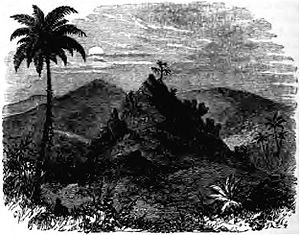
Bulu (Fijian mythology)
Encyclopedia

Underworld
The Underworld is a region which is thought to be under the surface of the earth in some religions and in mythologies. It could be a place where the souls of the recently departed go, and in some traditions it is identified with Hell or the realm of death...
). In the month called Vula-i-Ratumaibulu, the god Ratumaibulu
Ratumaibulu
In the mythology of Fiji, Ratumaibulu is a god of great importance who presides over agriculture. In the month called Vula-i-Ratumaibulu, he comes from Bulu, the world of spirits, to make the breadfruit and other fruit trees blossom and yield fruit...
comes from Bulu, the world of spirits, to make the breadfruit and other fruit trees blossom and yield fruit. Ratumaibulu is a god of great importance who presides over agriculture. Another source refers to a "place called 'Nabagatai
Nabangatai
In Fijian mythology, Nabagatai is a village on the road to Bulu, where the souls of the dead live ....
' on the road to 'Bulu', the separate state or land of souls".
The most westerly point of the island of Vanua Levu
Vanua Levu
Vanua Levu , formerly known as Sandalwood Island, is the second largest island of Fiji. Located 64 kilometres to the north of the larger Viti Levu, the island has an area of 5,587.1 km² and a population of some 130,000.- Geography :...
was the place from which the departed spirits started out for Bulu, the eternal abode of the blessed (Freese 2005:70).

